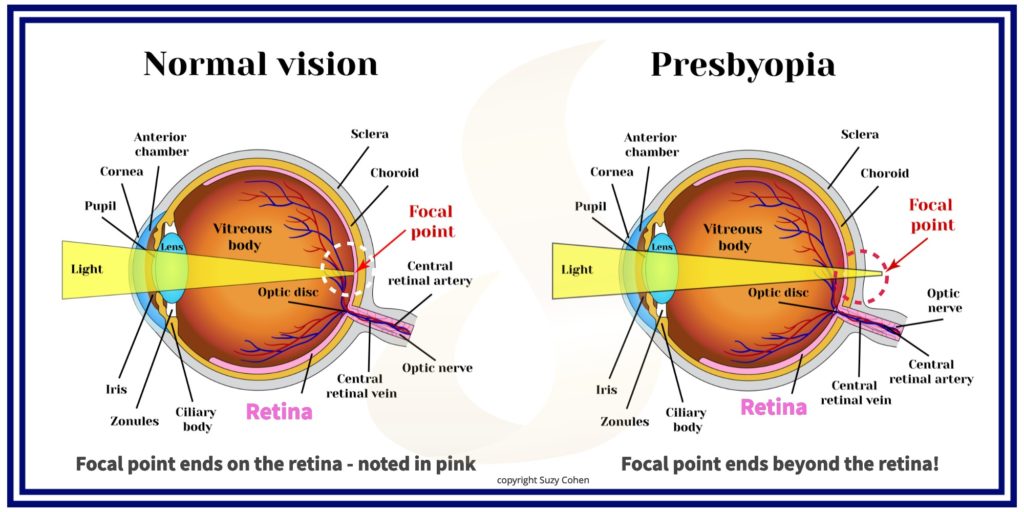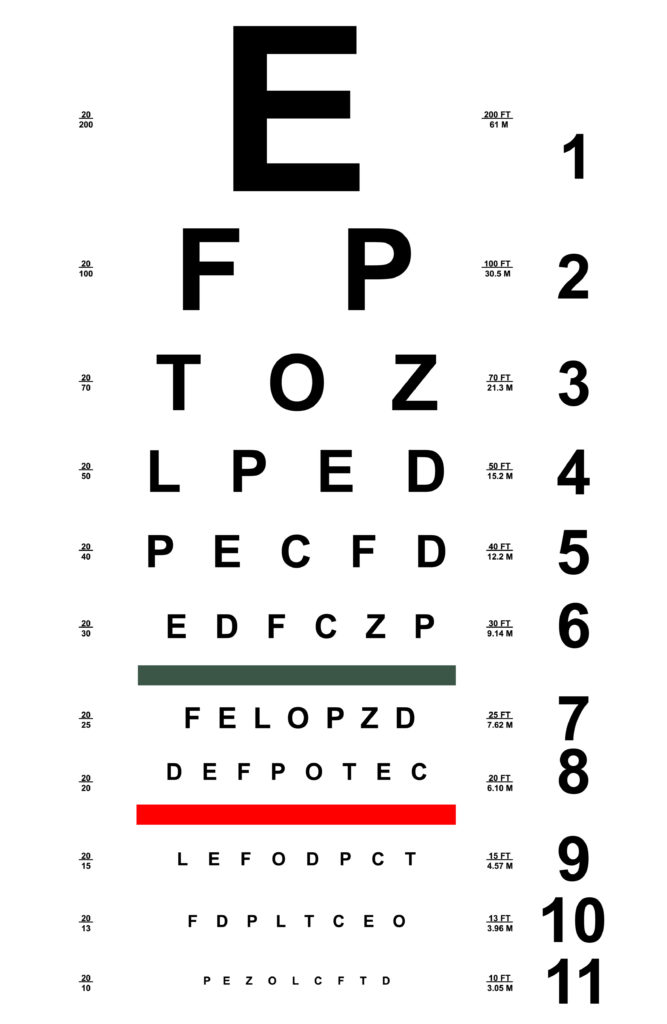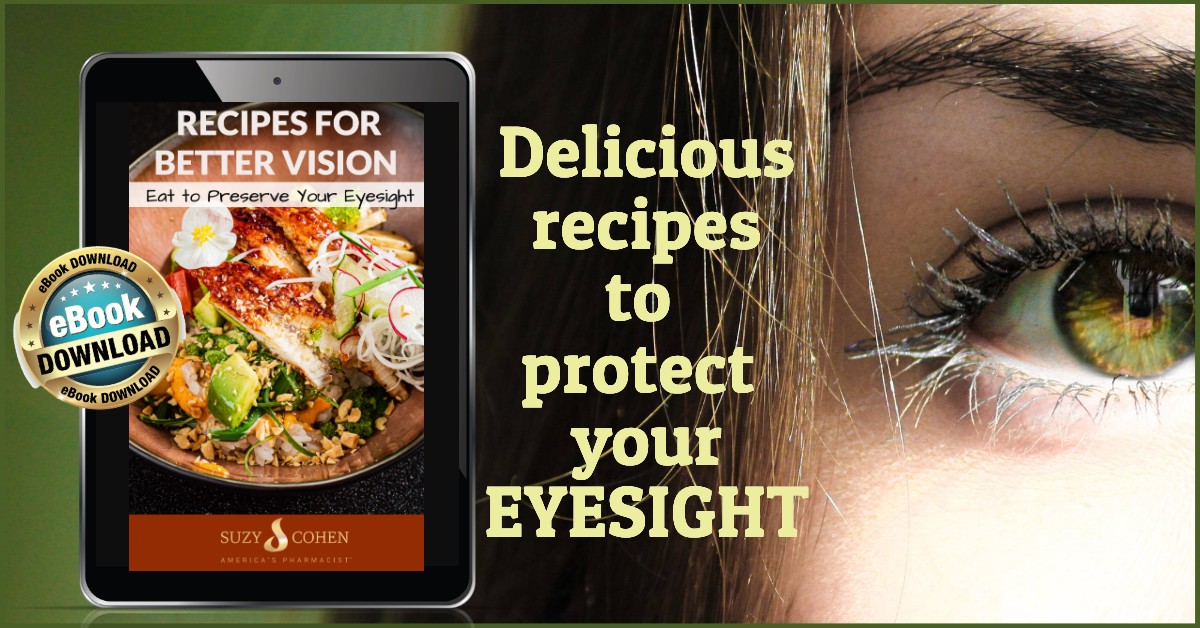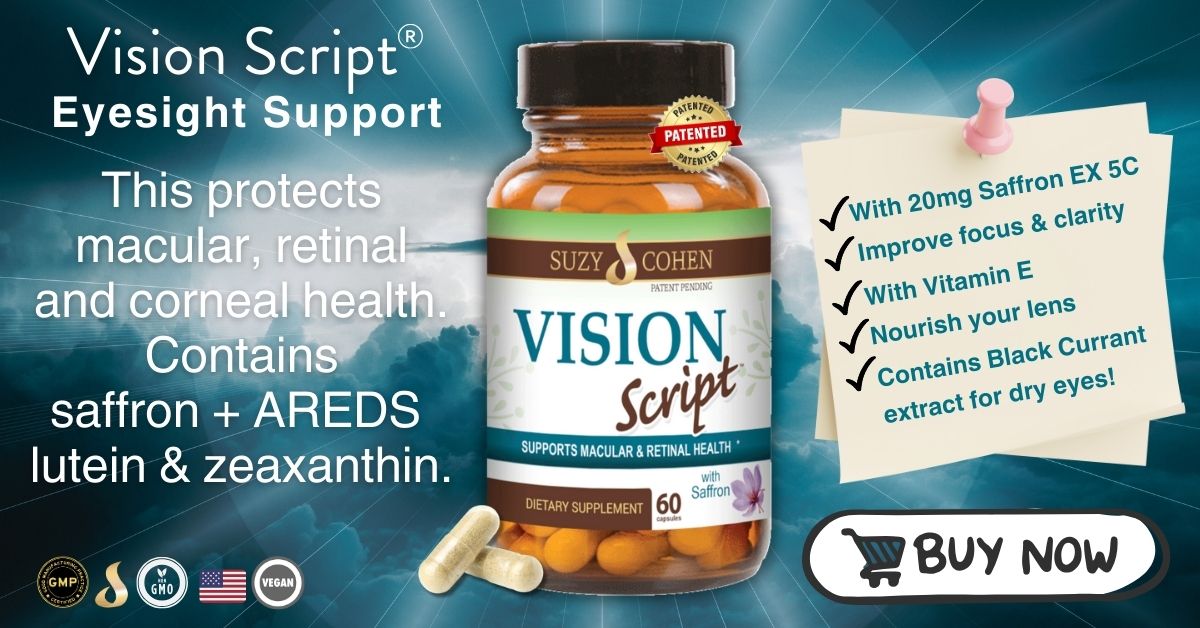What's On This Page?
ToggleAs we get older, most people experience blurry vision, and sometimes other eye problems. With blurry vision, it’s hard to see things clearly because the lenses of our eyes become less supple. The lens gets stiffer and doctors concur that the condition isn’t easily reversible.
 If you don’t have this problem, someone you know does because about half of the American population has it!
If you don’t have this problem, someone you know does because about half of the American population has it!
What happens is the lens in your eyes are no longer bendy, so they don’t quickly change shape anymore meaning you can’t focus on close-up pictures or words. Things go out of a focus now, whereas in the past, you could probably focus very efficiently, and very quickly.
I don’t like to name problems such as this as a “disease,” however if researching on your own, the term for this is “presbyopia.” I’ve also seen it referred to as “age related blurry near vision” in some papers.
The situation is common affecting millions of adults who are over the age of 40. The worst thing you can do is read or scroll on your phone or device in total darkness because the blue light and strain of this will negatively impact your eyesight, even if you don’t have an eye disorder like glaucoma.

With the advent of digital screens and smartphones, there is an exploding number of cases with teenagers experiencing blurry vision, among other eye conditions. A Nielsen stat I read said that 66% of kids today have their own smartphone! One estimate states that the average person spends about 7 hours a day on their device! That’s a lot of eye strain at such a young age.
What are the primary symptoms?
Do you have a tendency to hold your book or other reading material a little farther away than normal? Doing this makes the letters come into focus for you, right? If so you could have presbyopia. Other signs and symptoms include headaches, eye pain and tired eyes.
What can you do for blurry vision?
There is much you can do, but before trying my suggestions, please see your local eye doctor. The condition can be spotted pretty easily by an ophthalmologist and/or an optometrist.
Here are 8 natural, non-drug options for Presbyopia?
Glasses.
One very quick and affordable option is to buy reading glasses and see if they work. These are also called “cheater” glasses and you see them sold in pharmacies and department stores in all types of styles. You can choose from various strengths such as 1.5X or 2X or 3X and so forth. I have a pair of these myself that I use for beading and sewing.
Eye Exercise.
There are certain eye exercises that you can do to keep your lens malleable, however, you’d have to talk to your optometrist about that. I don’t know anything about this type of exercise.
I can however tell you that exercising your body is a good thing because it improves blood flow throughout the body, and it’s fundamental to good health from head to toe. But there are specific eye “exercises” which a doctor can share with you.

Blood Sugar.
I can tell you that maintaining a healthy blood sugar is important. Diabetes is known to impact eyesight, and uncontrolled blood sugar (and blood pressure) will adversely effect the retina, optic nerve and more! The optic nerve is what’s damaged in glaucoma, and may lead to blindness if untreated.
Tea.
I’ve read that drinking green tea (or matcha) is useful because the antioxidants and flavonoids in the tea leaves protect our cornea, macula and optic nerve. It’s not just the EGCG in green tea, there are other powerful antioxidants so I feel that drinking it as a whole herb is better than a targeted EGCG supplement… or you could do both if you wanted.
Another tea that I like for vision is African Red Bush also known as Rooibos tea. This supports the finest of our arteries and improves microvascular circulation which means it will improve blood to your optic nerve, and all over.
Vitamins and Herbs.
There are several critical vitamins and herbal extracts that have research to back their use in vision health. You can research on your own to see all the positive benefits with fish oils, black currant seed extract, vitamin A, zinc, and the prized flower-derived extract called saffron. Here are 3 Ways Saffron Helps Eyes.
Other nutrients that are part of the famous AREDS protocol include lutein and zeaxanthin which are found in many fruits and vegetables, as well as eye vitamins. I wish I could elaborate more about the value of all of these, however right now, I can say they all support healthy eyes and visual acuity.*
Diet.
A clean and balanced diet that includes foods rich in vitamin A would be terrific! If you could eat more leafy greens, and sweet potatoes, carrots, citrus fruits, broccoli and other superfoods, it would be good for you. Lean meats, high-quality oils (while cooking) and oily fish could be helpful too.
If you’d like to get some awesome Recipes for Better Vision, CLICK HERE and download my ebook.
There is a new medication.
In October 2021, the FDA approved a new eye drop called Vuity® made by the company called AbbVie. It comes in the strength of 1.25% and works in 15 minutes to help you focus. The benefits last about 6 hours. It improves near vision, without impacting distance vision and is most helpful for mild-moderate cases. You would apply 1 drop daily into each eye.
The side effects currently reported are mild headache and temporary eye redness/irritation. In addition to this, there may be a short lag of time where vision may remain blurry while you change your focus. For example, while looking at objects up close and then switching to view something in the distance.
For this reason, it is advised to use caution while driving (and avoid using dangerous machinery) until you are used to the eye drops and sure of how they affect you.
The chemical ingredient of Vuity® is known generically as pilocarpine and pilocarpine eye drops have been available by prescription for decades. The literature on this medication says that the advantage of Vuity® is that it can rapidly adapt to your tear film’s pH, making applications of the eye drop more comfortable and efficient.
And for this advantage, it will have a higher price tag than old, generic pilocarpine eye drops… unless of course, your insurance pays for it.
More about pilocarpine.
The chemical ingredient is called pilocarpine. The value of pilocarpine for eye health has been well-established for decades, and doctors have prescribed this medication for a long time! Vuity® is a new and improved version of other, older eye drops.
Ophthalmic pilocarpine is prescribed to treat glaucoma and works by draining fluid from the eye, and relieving the pressure. It has to be an ongoing drug, meaning if you stop taking it, your visual acuity reverts. In other words, it isn’t a cure, it doesn’t reverse presbyopia, it’s just a treatment for a few hours. All prescription ophthalmic pilocarpine drops work this way and provide temporary help.
Just as an aside, there are pilocarpine pills that treat dryness of the mouth in case you have reduced saliva. That is such an uncomfortable and annoying condition that I would be remiss if I didn’t tell you that while I’m discussing pilocarpine. Patients with Sjogren’s syndrome could benefit, as could those undergoing radiation treatment.
Speaking of healthy eyes, I have created a custom formula that includes all the AREDS nutrients (except copper), and it is nothing short of amazing! If you are interested in supporting your eye health naturally learn more about Vision Script
For more information on Vuity, read their PRESS RELEASE.
You can also learn more about presbyopia and the
American Optometric Association.
If you enjoyed this article, and would like to learn more about eye health and vision, I’ve written other articles which you can look at here:
Natural Ways to Improve Eyesight
Black Currants Help with Night Vision
What to Do for Dry Eyes and Blurry Vision

Suzy Cohen, has been a licensed pharmacist for over 30 years and believes the best approach to chronic illness is a combination of natural medicine and conventional. She founded her own dietary supplement company specializing in custom-formulas, some of which have patents. With a special focus on functional medicine, thyroid health and drug nutrient depletion, Suzy is the author of several related books including Thyroid Healthy, Drug Muggers, Diabetes Without Drugs, and a nationally syndicated column.


